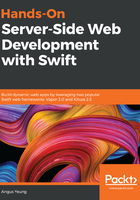
Conventions used
There are a number of text conventions used throughout this book.
CodeInText: Indicates code words in text, database table names, folder names, filenames, file extensions, pathnames, dummy URLs, user input, and Twitter handles. Here is an example: "The decode() function returns a future for HTTPStatus".
A block of code is set as follows:
router.post("new") { req -> Future<HTTPStatus> in
return req.content.decode(Entry.self).map { entry in
print("Appended a new entry: \(entry)")
return HTTPStatus.ok
}
}
When we wish to draw your attention to a particular part of a code block, the relevant lines or items are set in bold:
import Foundation
struct Entry: Codable {
var id: String
var title: String?
var content: String?
init(id: String, title: String? = nil, content: String? = nil) {
self.id = id
self.title = title
self.content = content
}
}
Any command-line input or output is written as follows:
$ vapor build
$ vapor run
Bold: Indicates a new term, an important word, or words that you see onscreen. For example, words in menus or dialog boxes appear in the text like this. Here is an example: "Navigate down the list and click on the Swift Web App with Kitura icon".